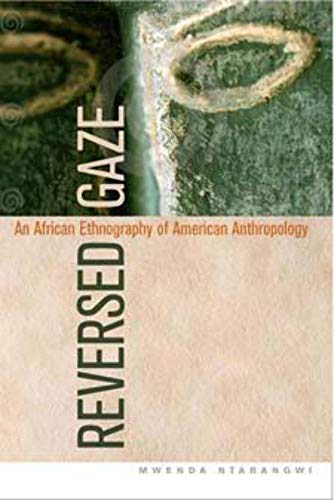Reversed Gaze
An African Ethnography of American Anthropology
Mwenda Ntarangwi
BOOK REVIEW

In the compelling and transformative narrative of Reversed Gaze: An African Ethnography of American Anthropology, Mwenda Ntarangwi opens a portal revealing the rich complexity of cultural interactions and the ethnographic landscape through an African lens. This isn't merely a book; it's a profound invitation to view the world through eyes not shaped by Western narratives but rather by the sobering truths of African experiences and perspectives.
Ntarangwi, an erudite voice in anthropology, takes you on a journey that challenges the status quo, dissecting the Western-centric gaze that has long dominated the field of anthropology. With a critical but compassionate pen, he invites readers to grasp the profound implications of understanding cultures from within rather than merely observing them as distant spectacles. His writings resonate like a clarion call, urging you to rethink assumptions, question established narratives, and engage sincerely with the vibrant tapestry of African identity and agency.
Set against the backdrop of a world often steeped in colonial misunderstandings, "Reversed Gaze" compels you to confront the uncomfortable truths about power dynamics in anthropology. Ntarangwi's academic prowess shines through as he eloquently critiques colonial legacies, asserting the necessity of an African perspective in anthropological discourse. This urgency strikes at the heart of contemporary scholarship, as it inspires a revolutionary thought: what if the very framework we built our knowledge upon is fundamentally flawed from the outset?
Readers often highlight how Ntarangwi's style evokes an emotional response, making complex ideas not just digestible but also compellingly relatable. Many have expressed that his ability to weave personal narratives within the academic framework grants the reader an intimate connection to the material. Their words resonate with a determination to elevate African voices that have historically been sidelined, turning the act of reading into a journey of empathy and enlightenment.
This book is not without its share of controversy. Critics have argued that Ntarangwi's passionate approach at times veers into the realm of idealism. Some scholars question whether he undermines legitimate critiques of African voices by overshadowing them with his own fervent narrative. However, the debates spurred by such reflections are precisely what make this work essential-it places you at the crossroads of opinion, urging a reckoning with the biases inherent in anthropological studies.
Historical context adds layers to Ntarangwi's work. Written in the wake of significant global shifts in perception regarding race, identity, and power, Reversed Gaze serves as a timely reminder of the necessity for inclusive dialogues that bridge cultural divides. In the wake of movements advocating for social justice and equality, the book's urgency unfolds like a banner for change, resonating with those who believe in the power of stories to dismantle prejudices and foster understanding.
As you delve into Ntarangwi's exploration, you will find yourself grappling with the power of the ethnographic gaze. Each chapter serves as both a mirror and a window; reflecting your preconceived notions while simultaneously offering glimpses into the vibrant cultures that fill the African continent-cultures rich with diversity, resilience, and a myriad of voices yearning to be heard.
Stepping into the pages of Reversed Gaze isn't just about reading; it's about awakening to the realization that our understanding of culture is incomplete and often marred by superficial interpretations. Ntarangwi pushes you beyond comfort zones, urging you to witness the profound implications of perspective-and why it matters when examining not only anthropology but the very fabric of collective human experience.
As you close the last chapter, prepare to feel not simply informed but transformed. The urgency behind Ntarangwi's writings lingers long after you turn the final page, compelling you to join a broader conversation on representation in anthropology. Each word, each argument, ignites a desire to continue questioning, learning, and embracing the rich complexities of the world around you. This is not just a book you read but one that demands to be experienced and felt deeply. Don't let Reversed Gaze slip through your fingers-let it challenge you, inspire you, and ultimately change the way you see the world.
📖 Reversed Gaze: An African Ethnography of American Anthropology
✍ by Mwenda Ntarangwi
🧾 176 pages
2010
#reversed #gaze #african #ethnography #american #anthropology #mwenda #ntarangwi #MwendaNtarangwi